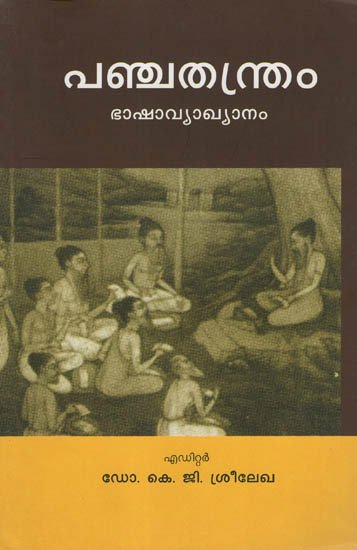Panchatantra [sanskrit]
by Dr. Naveen Kumar Jha | 2016 | 13,828 words | ISBN-13: 9788193077962
The Sanskrit edition of the Panchatantra referencing the English translation and grammatical analysis. Written by Vishnu Sharma and possibly dating as early as 1200 BCE, the Panchatantra (or Pancatantra) represents a collection of short stories teaching basic ethical values and moral conduct that was commonly practiced in ancient Indian. Alternative titles: Śrīviṣṇuśarman Pañcatantra (श्रीविष्णुशर्मन् पञ्चतन्त्र, Śrī-viṣṇuśarman pancatantra, श्री-विष्णुशर्मन्, Sri-visnusarman)
Verse 1.31
निरतिशयं गरिमाणं तेन जनन्याः स्मरन्ति विद्वांसः ।
यत् कम् अपि वहति गर्भं महताम् अपि यो गुरुर् भवति ॥ ३१ ॥
niratiśayaṃ garimāṇaṃ tena jananyāḥ smaranti vidvāṃsaḥ |
yat kam api vahati garbhaṃ mahatām api yo gurur bhavati || 31 ||
The English translation of Panchatantra Verse 1.31 is contained in the book The Complete Pancatantra: Sanskrit Text with English Translation by Dr. Naveen Kumar Jha. This book is not available online so in order to read the full text and translation you should buy the book:
Buy now! English translation by Dr. Naveen Kumar Jha (2016)
Glossary of Sanskrit terms
Note: This extracts Sanskrit terms and links to English definitions from the glossary, based on an experimental segmentation of verse (1.31). Some terms could be superfluous while some might not be mentioned. Click on the word to show English definitions.
Niratishaya, Gariman, Tad, Tena, Janani, Smarat, Smaranti, Vidvas, Yat, Yad, Kah, Api, Vahat, Vahati, Garbha, Mahat, Mahata, Yah, Guru, Bhavati, Bhavat, Bhavant,
Analysis of Sanskrit grammar
Note: this is an experimental feature and only shows the first possible analysis of the Sanskrit text (Panchatantra Verse 1.31). If the system was successful in segmenting the sentence, you will see of which words it is made up of, generally consisting of Nouns, Pronouns, Verbs, Participles and Indeclinables. Click on the link to show all possible derivations of the word.
- Line 1: “niratiśayaṃ garimāṇaṃ tena jananyāḥ smaranti vidvāṃsaḥ ”
- niratiśayam -
-
niratiśaya (noun, masculine)[adverb], [accusative single]niratiśaya (noun, neuter)[adverb], [nominative single], [accusative single]niratiśayā (noun, feminine)[adverb]
- garimāṇam -
-
gariman (noun, masculine)[accusative single]
- tena -
-
tena (noun, masculine)[compound], [vocative single]ta (noun, masculine)[instrumental single]ta (noun, neuter)[instrumental single]tad (noun, neuter)[instrumental single]sa (noun, masculine)[instrumental single]√tan (verb class 8)[perfect active second plural]√tan (verb class 4)[perfect active second plural]√tan (verb class 1)[perfect active second plural]
- jananyāḥ -
-
janani (noun, feminine)[ablative single], [genitive single]jananī (noun, feminine)[ablative single], [genitive single]
- smaranti -
-
smarantī (noun, masculine)[adverb]smarantī (noun, feminine)[compound], [adverb], [vocative single]smarantī (noun, neuter)[compound], [adverb], [nominative single], [vocative single], [accusative single]√smṛ -> smarat (participle, neuter)[nominative plural from √smṛ class 1 verb], [vocative plural from √smṛ class 1 verb], [accusative plural from √smṛ class 1 verb]√smṛ -> smarantī (participle, feminine)[vocative single from √smṛ class 1 verb]√smṛ (verb class 1)[present active third plural]
- vidvāṃsaḥ -
-
vidvas (noun, masculine)[nominative plural], [vocative plural]√vid -> vidvas (participle, masculine)[nominative plural from √vid class 2 verb], [vocative plural from √vid class 2 verb]
- Line 2: “yat kam api vahati garbhaṃ mahatām api yo gurur bhavati ”
- yat -
-
yat (indeclinable relative)[indeclinable relative]yat (noun, masculine)[compound]yad (noun, masculine)[compound], [adverb], [nominative single], [vocative single]yat (noun, neuter)[nominative single], [vocative single], [accusative single]√i -> yat (participle, neuter)[nominative single from √i class 2 verb], [vocative single from √i class 2 verb], [accusative single from √i class 2 verb]yat (pronoun, neuter)[nominative single], [accusative single]
- kam -
-
ka (noun, neuter)[adverb], [nominative single], [accusative single]ka (noun, masculine)[accusative single]kaḥ (pronoun, masculine)[accusative single]
- api -
-
api (indeclinable preposition)[indeclinable preposition]ap (noun, neuter)[locative single]api (Preverb)[Preverb]
- vahati -
-
vahati (noun, masculine)[compound], [adverb]vahatī (noun, feminine)[adverb], [vocative single]vahat (noun, feminine)[locative single]√vah -> vahat (participle, masculine)[locative single from √vah class 1 verb]√vah -> vahat (participle, neuter)[locative single from √vah class 1 verb]√vah (verb class 1)[present active third single]
- garbham -
-
garbha (noun, masculine)[adverb], [accusative single]garbhā (noun, feminine)[adverb]
- mahatām -
-
mahat (noun, masculine)[genitive plural]mahat (noun, neuter)[genitive plural]mahatā (noun, feminine)[accusative single]√mah (verb class 1)[imperative active third dual]
- api -
-
api (indeclinable preposition)[indeclinable preposition]ap (noun, neuter)[locative single]
- yo* -
-
yaḥ (indeclinable relative)[indeclinable relative]ya (noun, masculine)[nominative single]yaḥ (pronoun, masculine)[nominative single]
- gurur -
-
guru (noun, masculine)[nominative single]
- bhavati -
-
bhavatī (noun, feminine)[adverb], [vocative single]bhavat (noun, masculine)[locative single]bhavat (noun, neuter)[locative single]bhavant (pronoun, masculine)[locative single]bhavant (pronoun, neuter)[locative single]√bhū (verb class 1)[present active third single]
Other editions:
Also see the following editions of the Sanskrit text or (alternative) English translations of the Panchatantra Verse 1.31
Pancatantra of Visnusarman
by M. R. Kale (2015)
Panchatantra in Simple Sanskrit
by Dr. Vishwas (2016)
Panchatantram (Telugu)
by Tadanki Venkata Lakshmi Narasimha Rao (2020)
Published by J. P. Publications, Vijayawada; Throughout black & white Illustrations; 9788192053851.
Buy now!Preview of verse 1.31 in Telugu sript:
నిరతిశయం గరిమాణం తేన జనన్యాః స్మరన్తి విద్వాంసః ।
యత్ కమ్ అపి వహతి గర్భం మహతామ్ అపి యో గురుర్ భవతి ॥ ౩౧ ॥
Panchatantram Bhashavyakhyanam (Malayalam)
by Dr. K.G. Sreelekha (2010)
Published by the University of Kerala.
Buy now!Preview of verse 1.31 in Malayalam sript:
നിരതിശയം ഗരിമാണം തേന ജനന്യാഃ സ്മരന്തി വിദ്വാംസഃ ।
യത് കമ് അപി വഹതി ഗര്ഭം മഹതാമ് അപി യോ ഗുരുര് ഭവതി ॥ ൩൧ ॥
The Panchatantra Stories (Tamil)
by P. S. Aacharya (2017)
Published by Narmadha Pathippagam, Chennai.
Buy now!
Panchatantrer Galpa (Bengali)
by Children's Book Trust (2014)
Throughout color Illustration; 9788170112730
Buy now!Preview of verse 1.31 in Bengali sript:
নিরতিশযং গরিমাণং তেন জনন্যাঃ স্মরন্তি বিদ্বাংসঃ ।
যত্ কম্ অপি বহতি গর্ভং মহতাম্ অপি যো গুরুর্ ভবতি ॥ ৩১ ॥
Panchatantra in Gujarati (Comic)
by Anant Pai (2013)
[શિયાળા અને રણશિંગ પંચતંત્ર] Published by Amar Chitra Katha; Throughout Color Illustrations; 9789350853115
Buy now!Preview of verse 1.31 in Gujarati sript:
નિરતિશયં ગરિમાણં તેન જનન્યાઃ સ્મરન્તિ વિદ્વાંસઃ ।
યત્ કમ્ અપિ વહતિ ગર્ભં મહતામ્ અપિ યો ગુરુર્ ભવતિ ॥ ૩૧ ॥
![Panchatantra [sanskrit] - book cover](/uploads/a/Pancatantra.jpg)






